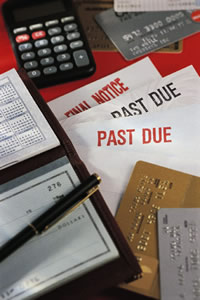Money Basics
Staying Out of Debt
Do you have a compulsive debt problem?
If your debt far exceeds the 20 percent rule, you may be a compulsive debtor. According to Debtors Anonymous, here are some other signs of compulsive indebtedness:

- Unclear financial situation. Not knowing account balances, monthly expenses, loan interest rates, fees, fines, or contractual obligations.
- Poor saving habits. Not planning for taxes, retirement, or other predictable items, and then feeling surprised when they come due.
- Compulsive shopping. Being unable to pass on what appears to be a good deal, making impulsive purchases, leaving price tags on clothes so they can be returned, and not using items you've purchased.
- Difficulty in meeting basic financial or personal obligations. Also, an inordinate sense of accomplishment when such obligations are met.
- Always dealing with a financial crisis. Using one credit card to pay another, and bouncing checks.
- Living paycheck to paycheck. Taking risks with health and car insurance coverage, writing checks without knowing your checking account's balance.
- Overworking or under-earning. Working extra hours to earn money to pay creditors, taking jobs below your skill and education level.
- Living in self-imposed deprivation. Denying your basic needs in order to pay your creditors.
- A false feeling of hope. The belief that someone will take care of you if necessary so you won't get into serious financial trouble.
If you are struggling with debt, seek help. Look for resources in your community, and check out the resources at the end of this lesson.






